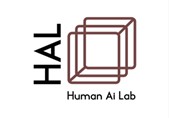HAL – Human Ai Lab is an interdisciplinary centre aiming to promote and carry out research on artificial intelligence in order to improve the human condition and serve collective needs. The goal is to develop research, training, technology transfer and experimentation in the following areas:
- Criticism of Artificial Intelligence;
- Digital ethics and politics;
- New technology law;
- Sustainability and participation in digital technologies;
- Digital economy.
These issues are addressed in the Centre's activities with a multidisciplinary approach that aims to promote theoretical and applied research in the areas indicated.
OBJECTIVES
The HAL Research Centre aims to contribute to building a digital future in which artificial intelligence is taken into account from a political perspective, critically analyzed, regulated and ethically oriented – thus ensuring sustainability, fairness and democratic participation.
Therefore, HAL aims to encourage theoretical and applied research in the fields of artificial intelligence criticism, digital ethics and politics, new technology law, sustainability and digital participation, and platform economics, through a multidisciplinary and integrated approach. We are committed to promoting a stimulating, inclusive laboratory capable of connecting knowledge and people, promoting research that not only aims to understand and critique the emerging technologies, but also guides their evolution towards the common good.
RESEARCH LINES
In compliance with the academic policy, HAL promotes education, policy and practice in artificial intelligence. Led by faculty members from various departments at Link Campus University, its research activity is mainly focused on the human condition in its interaction with different forms of AI; the study and analysis of the political and social impact of AI; the regulatory implications of its different applications and new scenarios in jurisprudence; and the use of AI in scientific fields such as medicine and security.
Similarly, the Centre aims to act as a political player promoting national, European and international discussions that lead to a direct legislative impact.
Research areas:
- Impact studies and critical assessment of AI systems, with particular attention to the ethical, social and political aspects of technology, in order to develop guidelines and models for responsible governance;
- Regulatory and legal research on new technologies, focused on regulation and the protection of human rights in the digital sphere;
- Projects dedicated to environmental and social sustainability in the adoption of digital technologies, promoting inclusive models of collective participation;
- Economic analyses of the impact of digital technologies and AI on production systems and markets, aiming to balance innovation and equity;
- Training and technology transfer activities aimed at promoting an interdisciplinary and informed culture on artificial intelligence for researchers, professionals and citizens.
ORGANIZATION
Director:
Prof. Marco Filoni
Governing Council:
Legal area: Prof. Francesca Bartolini
Legal and economic area: Prof. Luca Boggio
Human-machine interaction area: Prof. Brunella Botte
Education technologies area: Prof. Giada Marinensi
Stem area: Prof. Manuela Minozzi
Cybersecurity area: Prof. Paolo Poletti

